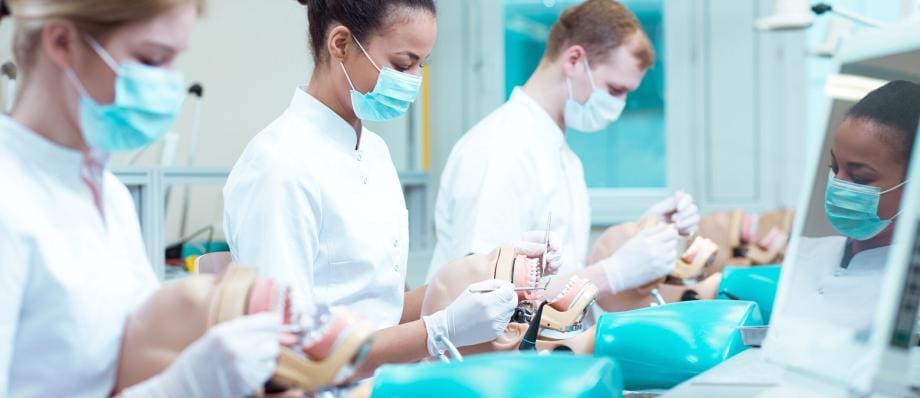Dentistry is a fundamental branch of healthcare that focuses on oral health and hygiene. Dentists play a vital role in diagnosing, treating, and preventing dental and oral diseases. Becoming a dentist requires rigorous education and training, typically obtained through a dental education program at a university. In this article, we will delve into the details of dentistry education in the UK, outlining the various stages, curriculum, clinical training, and future prospects for aspiring dental professionals.
Stages of Dentistry Education
- Pre-Dental Education
- UK Clinical Aptitude Test (UKCAT) or Biomedical Admissions Test (BMAT)
- Dental School (BDS Program)
Pre-Dental Education
Before entering a dental school, individuals must complete pre-dental education at the undergraduate level. Common prerequisites include courses in biology, chemistry, physics, and mathematics. Aspiring dentists often pursue a Bachelor of Science (BSc) or a Bachelor of Arts (BA) degree with a focus on the sciences to fulfill these requirements.
The duration of the undergraduate degree, which serves as the foundation for dental school, typically takes three years for students in the UK. However, some courses may offer an integrated master’s degree (MBiolSci or MSci), which can extend the duration to four years.
UK Clinical Aptitude Test (UKCAT) or Biomedical Admissions Test (BMAT)
Prospective dental students are required to take the UK Clinical Aptitude Test (UKCAT) or the Biomedical Admissions Test (BMAT), standardized exams that assess their academic knowledge and critical thinking skills. The scores from these tests, along with other application materials such as letters of recommendation and extracurricular activities, are crucial in the dental school application process.
Dental School (BDS Program)
Upon successful completion of pre-dental education and meeting the necessary prerequisites, students can apply to dental school to pursue a Bachelor of Dental Surgery (BDS) degree. These programs generally last for five years and prepare students for a career as a licensed dentist.
Curriculum and Training
- Pre-Clinical Years
- Clinical Years
- Specializations and Electives
Pre-Clinical Years
In the first two years of dental school, students undergo comprehensive theoretical coursework. Subjects include dental anatomy, oral histology, biochemistry, dental materials, and oral pathology. Additionally, students learn about the human body, pharmacology, and various medical conditions that impact dental health.
Clinical Years
During the latter three years of dental school, students transition to clinical training. This involves hands-on experience treating patients under the supervision of experienced faculty members. They learn essential skills in diagnosing dental conditions, planning treatments, and performing dental procedures like fillings, extractions, root canals, and dental restorations.
Specializations and Electives
In the later stages of dental school, students can choose specializations or electives to focus their studies. These may include orthodontics, oral surgery, endodontics, pediatric dentistry, periodontics, and prosthodontics. Specializations allow for in-depth knowledge and expertise in a particular area of dentistry.
Clinical Placements and Externships
Dental schools often integrate clinical placements and externships into their curriculum. Students have the opportunity to work in various dental settings, including community clinics, hospitals, and private practices. These experiences provide exposure to diverse patient populations and real-world dental challenges.
Licensing and Post-Graduate Training
- Licensing Exams
- Post-Graduate Training (Foundation Training)
Licensing Exams
After completing the dental program, graduates must pass national and regional licensing exams to obtain their dental license. The Professional and Linguistic Assessments Board (PLAB) test is a crucial step for internationally qualified dentists seeking to practice in the UK.
Post-Graduate Training (Foundation Training)
Upon receiving their dental license, new dentists typically complete a one-year foundation training program, gaining practical experience in a supervised environment. This program provides a smooth transition from dental school to independent practice.
How Many Dental Schools Are There in The UK?
As of my last knowledge update in September 2023, there are currently 16 dental schools in the United Kingdom. These dental schools are located in various universities across the country. It’s important to note that the number of dental schools and their specific programs may change over time due to various factors, including educational reforms and institutional decisions.
For the most up-to-date and accurate information regarding the number of dental schools in the UK, We recommend referring to official sources such as the General Dental Council (GDC) website, the British Dental Association (BDA), or the respective websites of UK universities offering dental programs.
List of UK Dental Schools
As of my last update in January 2024, the following are some of the dental schools in the UK:
- University of Aberdeen – School of Dentistry
- University of Birmingham – School of Dentistry
- University of Bristol – School of Oral and Dental Sciences
- Cardiff University – School of Dentistry
- University of Dundee – School of Dentistry
- University of Glasgow – School of Medicine, Dentistry & Nursing
- King’s College London – Dental Institute
- University of Leeds – School of Dentistry
- University of Liverpool – School of Dentistry
- Barts and The London School of Medicine and Dentistry (Queen Mary University of London)
- University of Manchester – School of Dentistry
- Newcastle University – School of Dental Sciences
- University of Plymouth – Peninsula Dental School
- Queen’s University Belfast – School of Dentistry
- University of Sheffield – School of Clinical Dentistry
- University of Central Lancashire(Preston)
- University of Edinburgh – Edinburgh Dental Institute
- University College of London – Eastman Dental Institute
Future Prospects and Continuing Education
Upon completing foundation training, dentists can either enter general practice, pursue further training in a specific area of dentistry, or engage in academic or research pursuits. Continuing professional development (CPD) is essential for dentists to stay updated with advancements in dental technology, materials, and techniques.
Conclusion
Dentistry education in the UK is a comprehensive and demanding process that equips aspiring dentists with the knowledge, skills, and experience necessary to provide comprehensive oral healthcare. From pre-dental education to clinical training and specialization, the journey to becoming a licensed dentist involves dedication, hard work, and a commitment to lifelong learning. Dental professionals play a crucial role in improving and maintaining the oral health of individuals and communities, contributing to overall well-being and quality of life in the UK.





